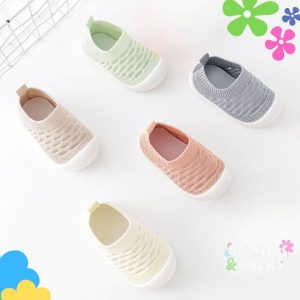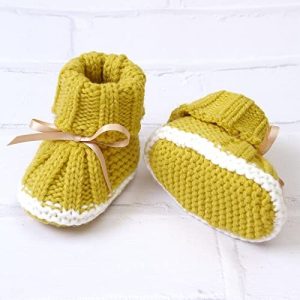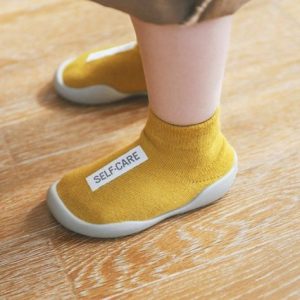Physical Address
304 North Cardinal St.
Dorchester Center, MA 02124
Physical Address
304 North Cardinal St.
Dorchester Center, MA 02124

The journey of parenthood is filled with countless questions, and a common one pops up when babies start toddling: Should they wear shoes? Here, we’ll explore the benefits of barefoot time for babies and when shoes might be necessary.
Experts recommend ample barefoot time for babies whenever possible. Bare feet allow for unrestricted movement and a natural sensory experience. This can benefit babies in several ways:
Bare feet allow the toes to grip and spread freely, which is important for healthy foot development.
Feeling the ground beneath their feet helps babies develop balance and coordination skills.
Bare feet allow babies to experience different textures and sensations, which is important for sensory development.
While barefoot time is ideal, there are situations where shoes become important for a baby’s safety and comfort:
Walking outdoors: Shoes can protect tiny feet from rough surfaces, like pavement or gravel.
Cold weather: Shoes can help keep feet warm in cold climates.
Certain environments: Daycares or other environments might have specific footwear requirements.
Remember: If you’re unsure whether your baby needs shoes, consult your pediatrician. They can provide personalized advice based on your baby’s development and activity level.

If you decide shoes are necessary, prioritize comfort and support. Here are some key features to look for:
Soft and flexible soles: Mimic barefoot walking for unrestricted movement.
Good fit: Snug heel, but enough wiggle room for toes to spread.
Secure closure: Stays on active little feet.
Breathable materials: Allows for air circulation to prevent sweaty feet.
Remember: It’s always best to have your baby try on shoes in person to ensure a proper fit.
Shoes should never restrict movement or cause discomfort. Here are some safety tips:

Barefoot time allows babies to explore the world with their senses and develop important skills. When shoes are needed, prioritize comfort and a proper fit. By following these tips, you can support your baby’s healthy foot development and walking journey!
There’s a lot of information out there about baby shoes, and it can be confusing for parents! Let’s explore the benefits of barefoot time for babies and when shoes might be a good idea.
Experts recommend letting your baby be barefoot whenever possible. This allows their feet to move and grow naturally, which can help with:

While barefoot time is great, there are times when shoes can be helpful for your baby’s safety and comfort:
Remember: If you’re unsure about whether your baby needs shoes, talk to your doctor. They can give you specific advice based on your baby’s development and activities.
If you do decide to get shoes for your baby, look for ones that are:
Remember: It’s always best to have your baby try on shoes in person to make sure they fit well.

Barefoot time is important for your baby’s development. But shoes can be helpful in some situations. When choosing shoes, focus on comfort and a good fit. By following these tips, you can help your baby’s feet grow healthy and strong!
When it comes to baby shoes, the most important thing is making safe choices. Here are some questions to consider:
Remember: It’s always best to prioritize your baby’s comfort and safety.

Making Informed Decisions
When it comes to baby shoes, the most important thing is making informed choices. Here are some resources that can help:
Remember: It’s always best to prioritize your baby’s comfort and safety.
It’s also worth noting that shoes should not be worn all the time. Just like with adults, babies benefit from periods of time without shoes to allow their feet to breathe and remain healthy. Overuse of shoes can lead to sweaty, uncomfortable feet and potentially even fungal infections. There’s no one-size-fits-all answer to the question of whether or not to put shoes on babies. The most important thing is to prioritize your baby’s comfort and safety. By understanding the benefits of barefoot time and when shoes might be necessary, you can make informed decisions about your baby’s footwear.
In conclusion, while it is okay to put shoes on babies, it should be done thoughtfully and with consideration for their developmental needs. Prioritizing barefoot time, choosing appropriate shoes for when they are necessary, and ensuring proper fit and comfort can all contribute to healthy foot development.